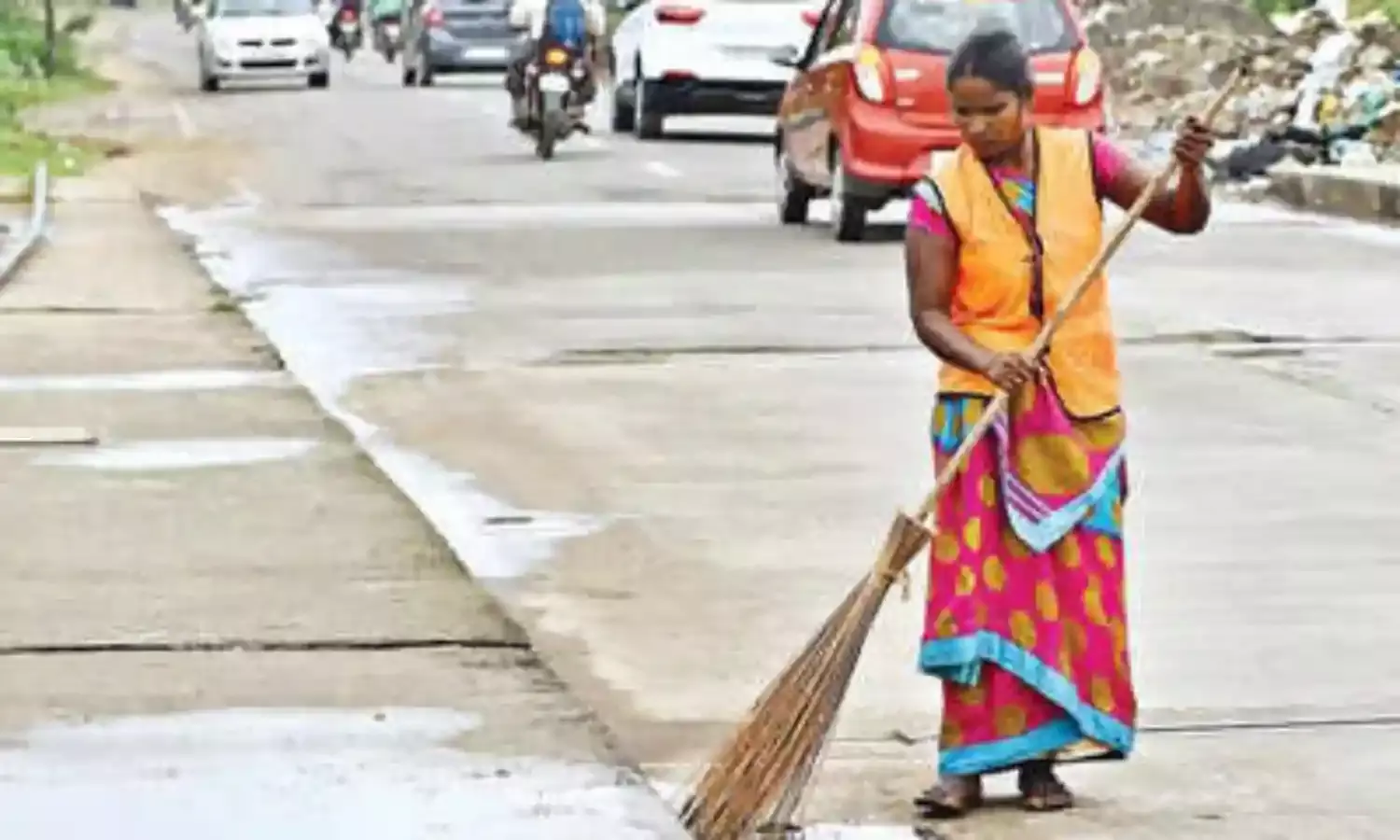India's Silent Frontline Workers: Sanitation Workers Lack Protective Gear
Despite government issued guidelines, sanitation workers lack PPEs, masks, gloves and sanitizers

Even as healthcare workers are (rightfully) lauded for their efforts as the world battles a global pandemic, another community of frontline workers seems forgotten. Sanitation workers fall within the ambit of essential services and are on the frontlines of the pandemic. India’s five million sanitation workers are exposed to toxic human waste every day, the health and medical ramifications of their work now compounded by the spread of covid-19. However, many sanitation workers say that they have not received protective gear that ensures their safety.
Naresh Kumar*, a sanitation worker working on a contract basis in Sadarpur, Sector 45, Noida Uttar Pradesh, pinned the blame on the government for failing to provide the necessary safety gear. “Mask ek bar shuru mein de diya tha aur fir diya hi nahi, sanitizer wagera kuch nahi dete (We were provided with a mask initially (April) but haven’t received another ever since. We have not even received hand sanitizers)” he said.
Naresh said that they’ve been using the same mask for nearly five months. A change of gloves, however, is provided every fifteen days. The lack of clean and timely protective equipment forces sanitation workers such as Naresh to work in unhygienic conditions with inadequate protection, and without monetary compensation for hazardous work.
In Uttarakhand, a sanitation worker Ratan* in the office of the Public Works Department, who has the responsibility of sanitation and cleanliness of the office said Personal Protective Equipment (PPE)/safety gear had not been provided. While government-issued guidelines on cleaning an indoor office mentions the procedure to dispose of PPEs, no PPE was provided in the first place.“ Mask nahi mila, meine khud ka le rakha hai (I did not receive a mask, I had to buy one for myself),” Ratan said. Individual hand sanitizers were also not given and Ratan says he makes-do with the sanitizer bottles placed around the office.
The problems are not limited to the provision of protective gear and material. There is little clarity on safety guidelines and protocol to collect household wastes, differentiating between quarantined and non-quarantined households.
A sanitation worker in the District Council of Nainital, Uttarakhand, Ravi Singh Joshi* said that garbage from quarantined houses is also taken and put in the vehicle with no extra protection. “Woh kuda andar se bahar rakh dete hai, hum uthakar andar rakh dete hai (they (residents) keep the garbage outside their house and we pick it and put it in our vans)”, he said.
This garbage is then disposed of in an open dumping ground irrespective of where it had been collected from. This is despite the instructions issued by the Ministry of Housing and Urban Affairs on the appropriate method to dispose waste from quarantined households.
The Ministry Of Social Justice and Empowerment had also published instructions for the safety of our silent frontline workers. One of the points in the guideline was to provide a ‘Mandatory orientation of Sanitation Workers and Wastepickers on COVID-19, Social Distancing norms and key precautionary measures to be taken including frequent hand-washing, avoid touching their face and wearing Personal Protective Equipments (PPE)’. No such orientation or training has been provided to a majority of the sanitation workers this reporter spoke to.
However, the situation seems better in some parts. In the city of Haldwani, a private NGO, Sayog Mahila Vikas Samiti has taken considerable steps to provide adequate protection for their employees working as sanitation workers. Gaurav Padaliya, works as a garbage collector and has been provided with a mask and three pairs of gloves on a daily basis, face covers, sanitizers and liquid hand wash. The employees of this NGO also go through weekly temperature checks. They are not made to pick garbage from houses under quarantine and anyone above the age of 50 has not been assigned to duty.
Some areas of Delhi are also keeping up with safety protocols. Chandra Shekhar, a sanitation worker in the New Delhi Municipal Corporation (NDMC) said adequate precaution is being taken. Gloves, masks , soap and sanitisers are provided to the workers. A worker who is on road duty is provided with a mask every two days and a fresh mask is provided every day to anyone on garbage duty.
Separate teams have been made for quarantined houses and non quarantine houses, and the team dealing with quarantined houses is also provided with PPE suits. The permanent workers of NDMC are also provided with medical cards, with provisions such as a monthly tetanus shot.
With cases of Covid-19 rising across the country, sanitation workers hope that their safety too is considered. Even as several guidelines have been provided by the government, adherence to these guidelines falls short. After a plea was filed in the Supreme Court for providing protective gear to sanitation workers, the centre responded saying that requisite protection gear has been provided to sanitation workers and safai karamchaaris, and guidelines by the WHO are being followed. This intention needs to become reality.
*Names changed
(Cover Photo Credit: TOI)


